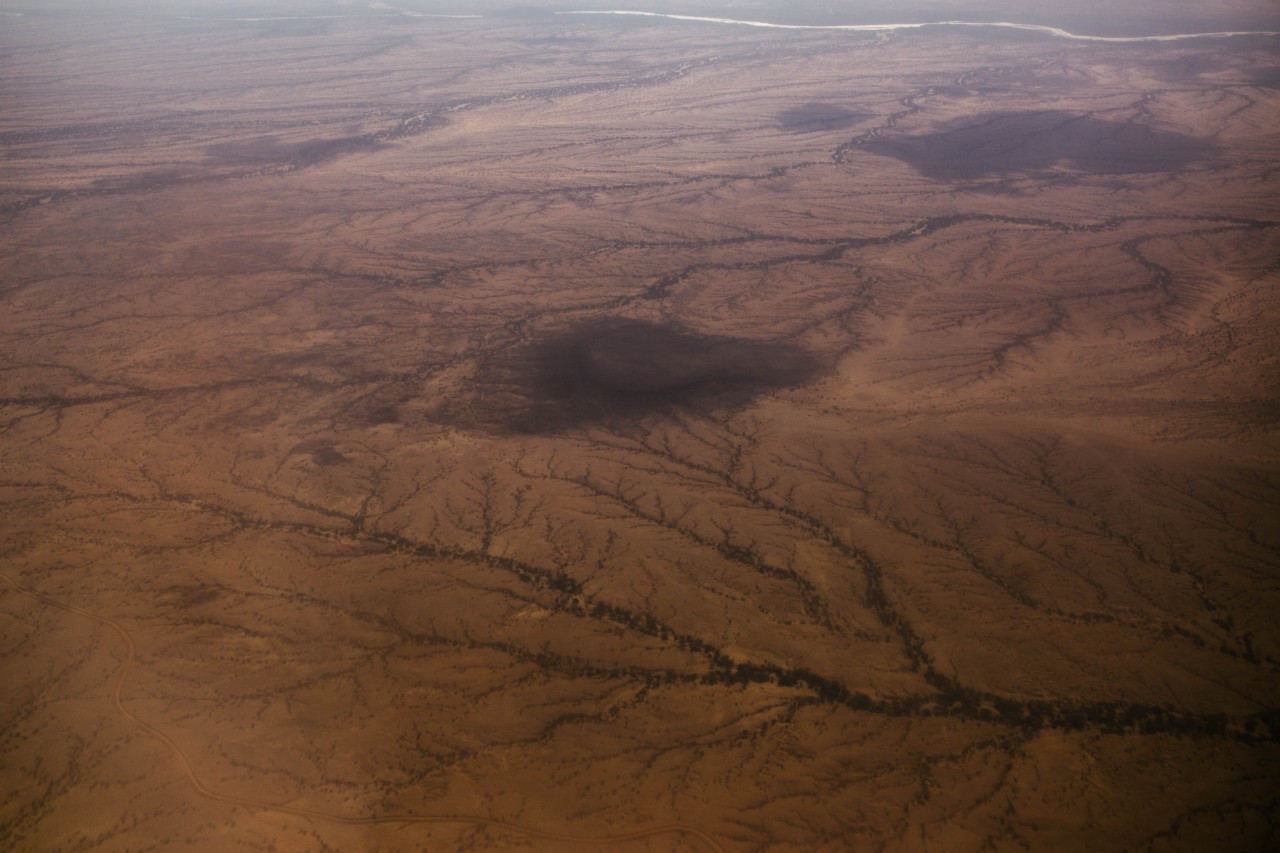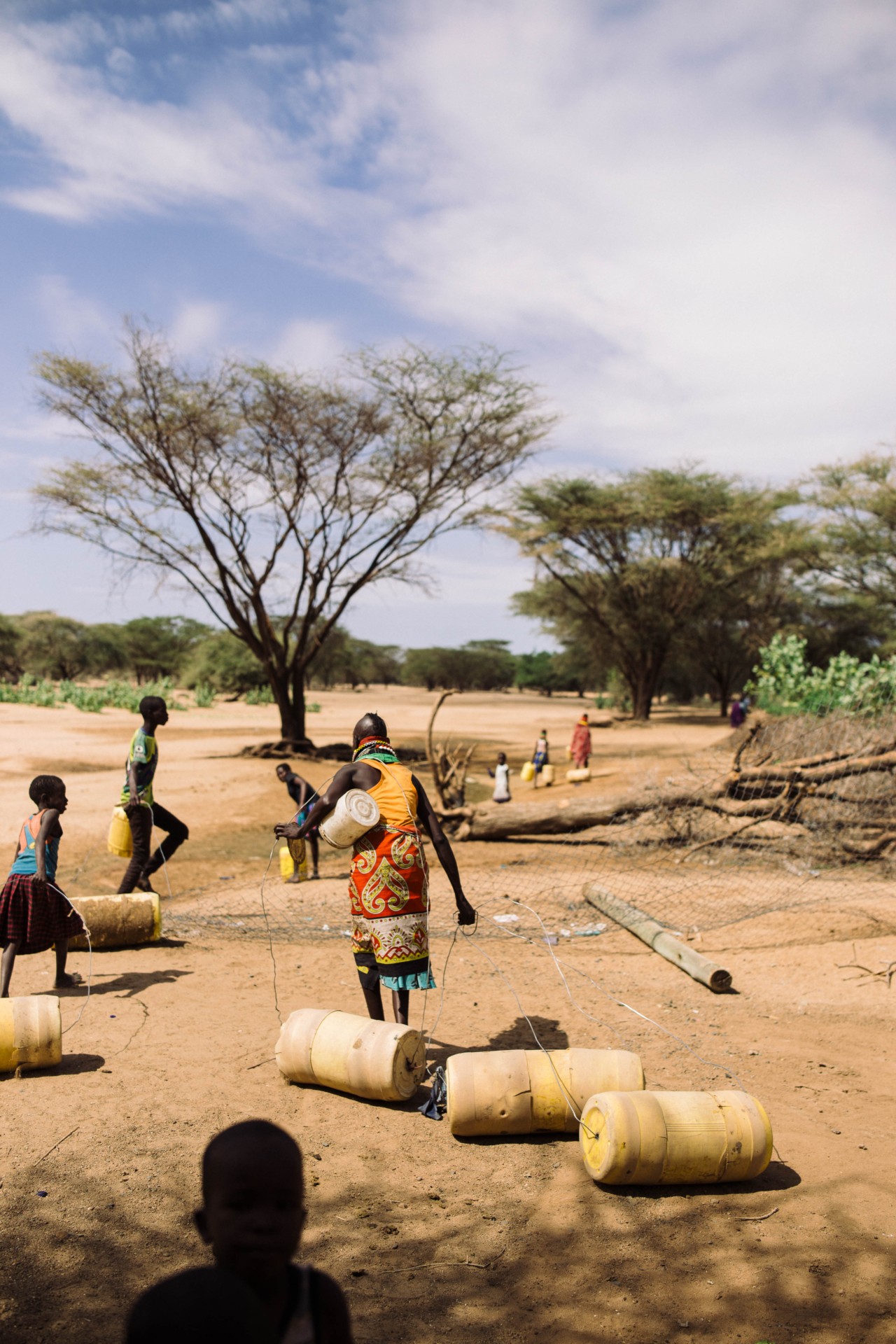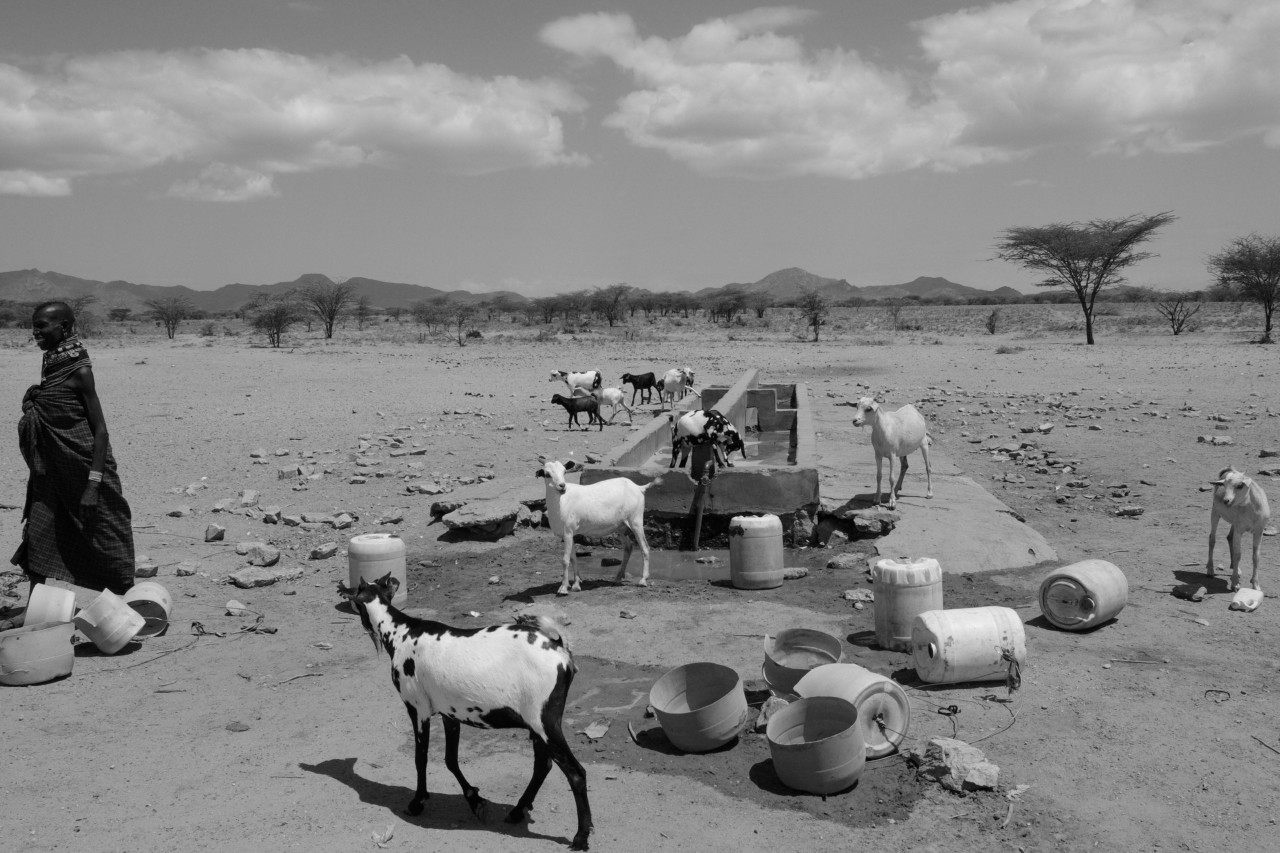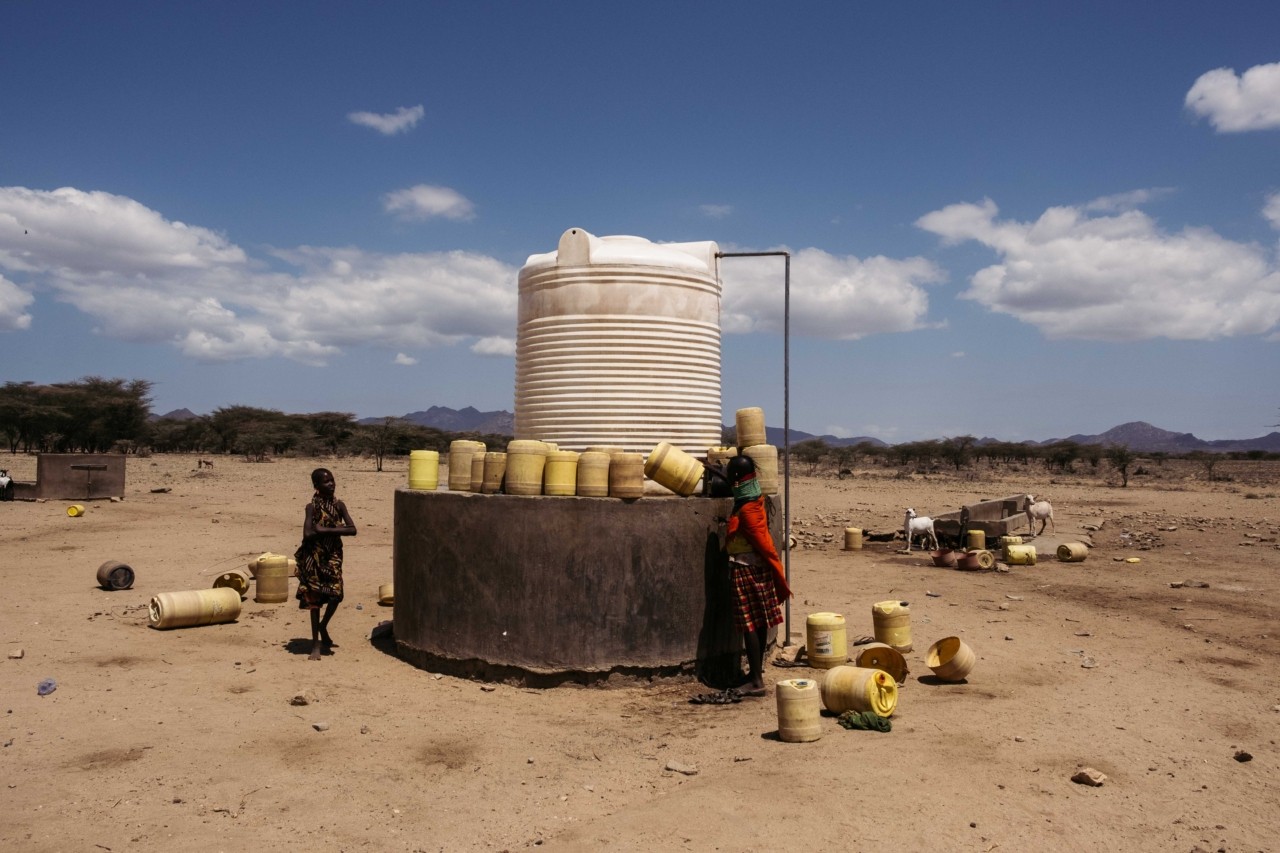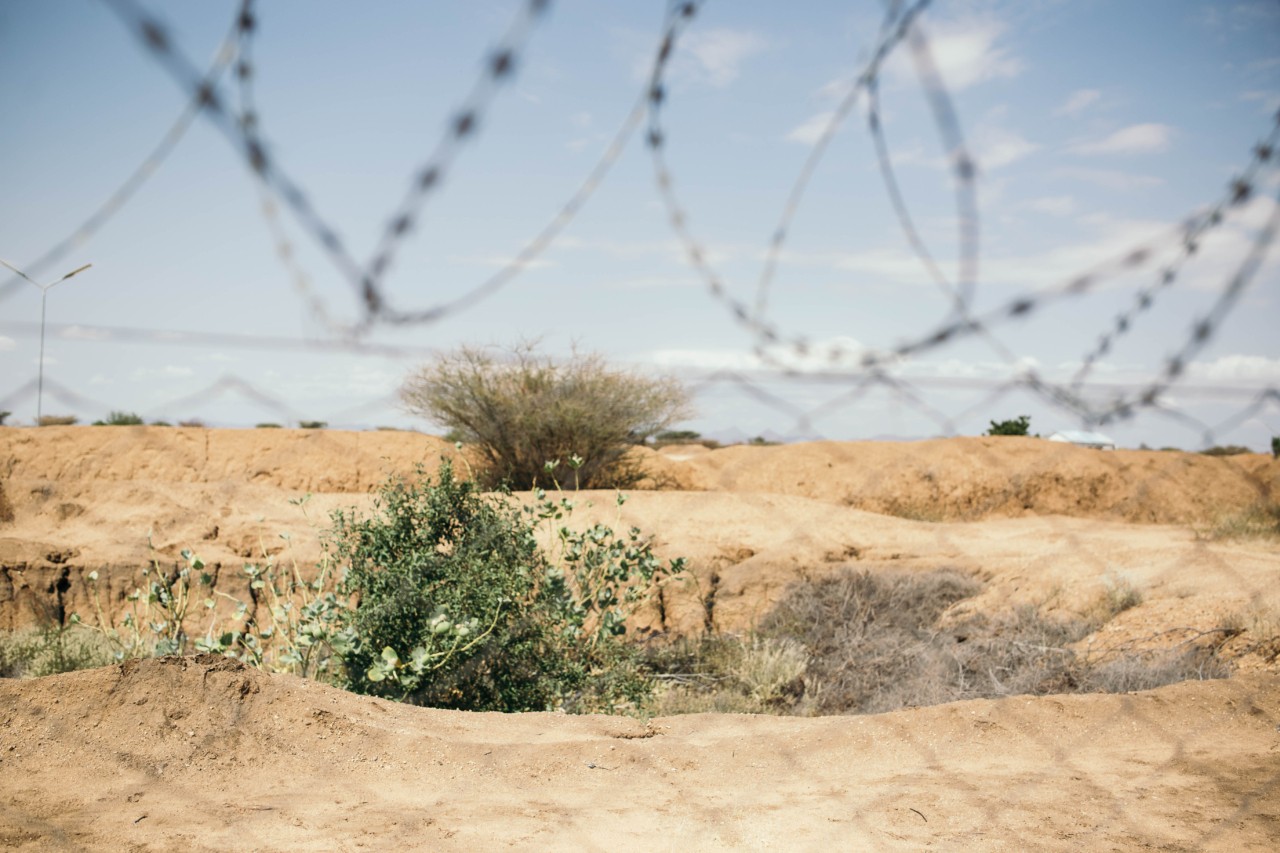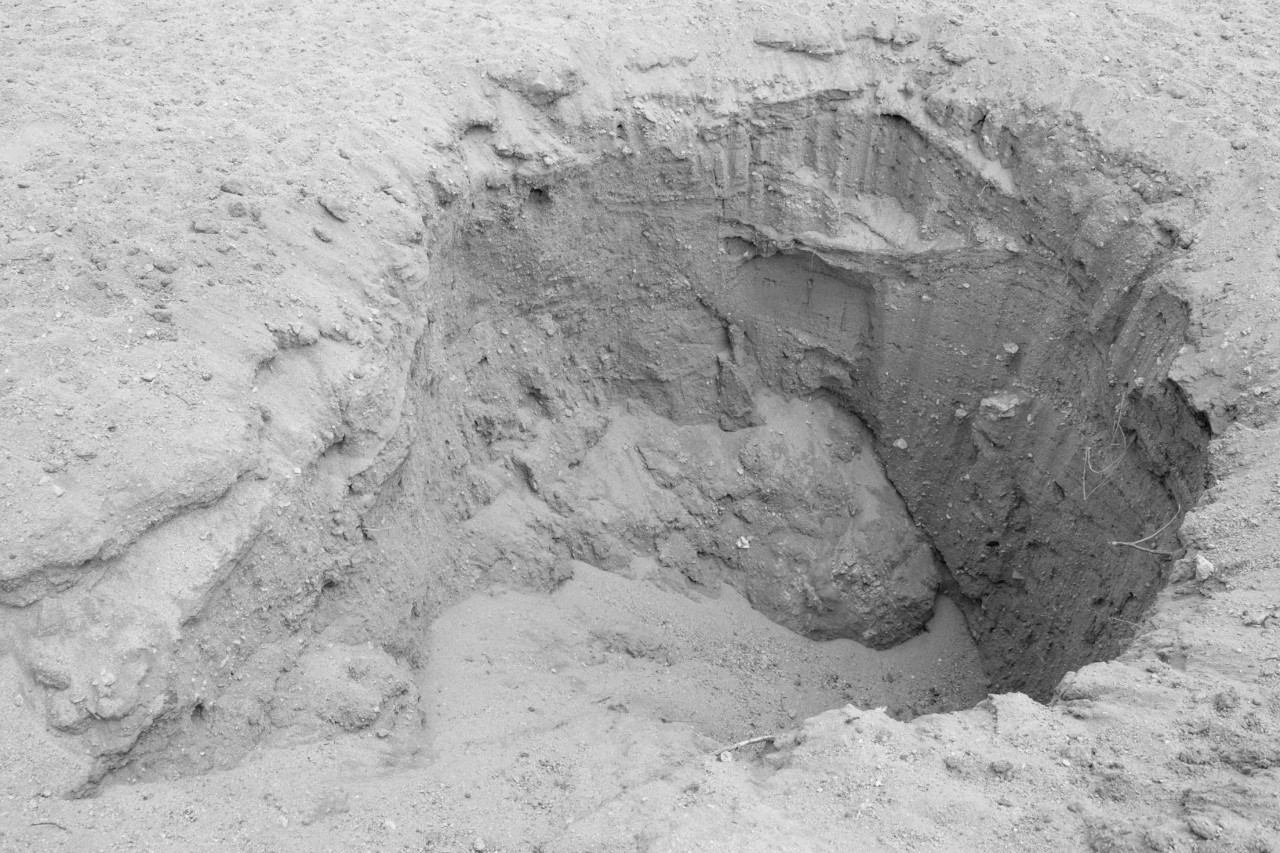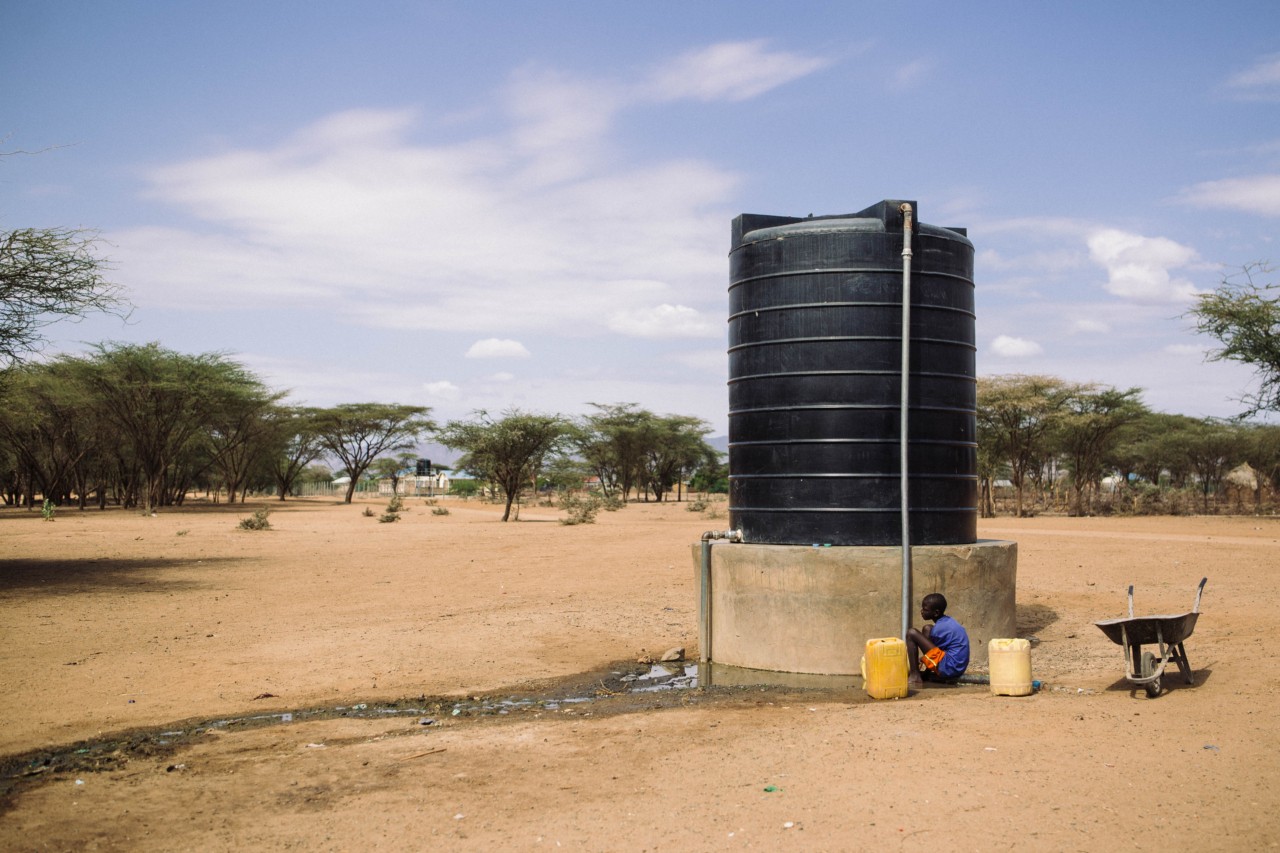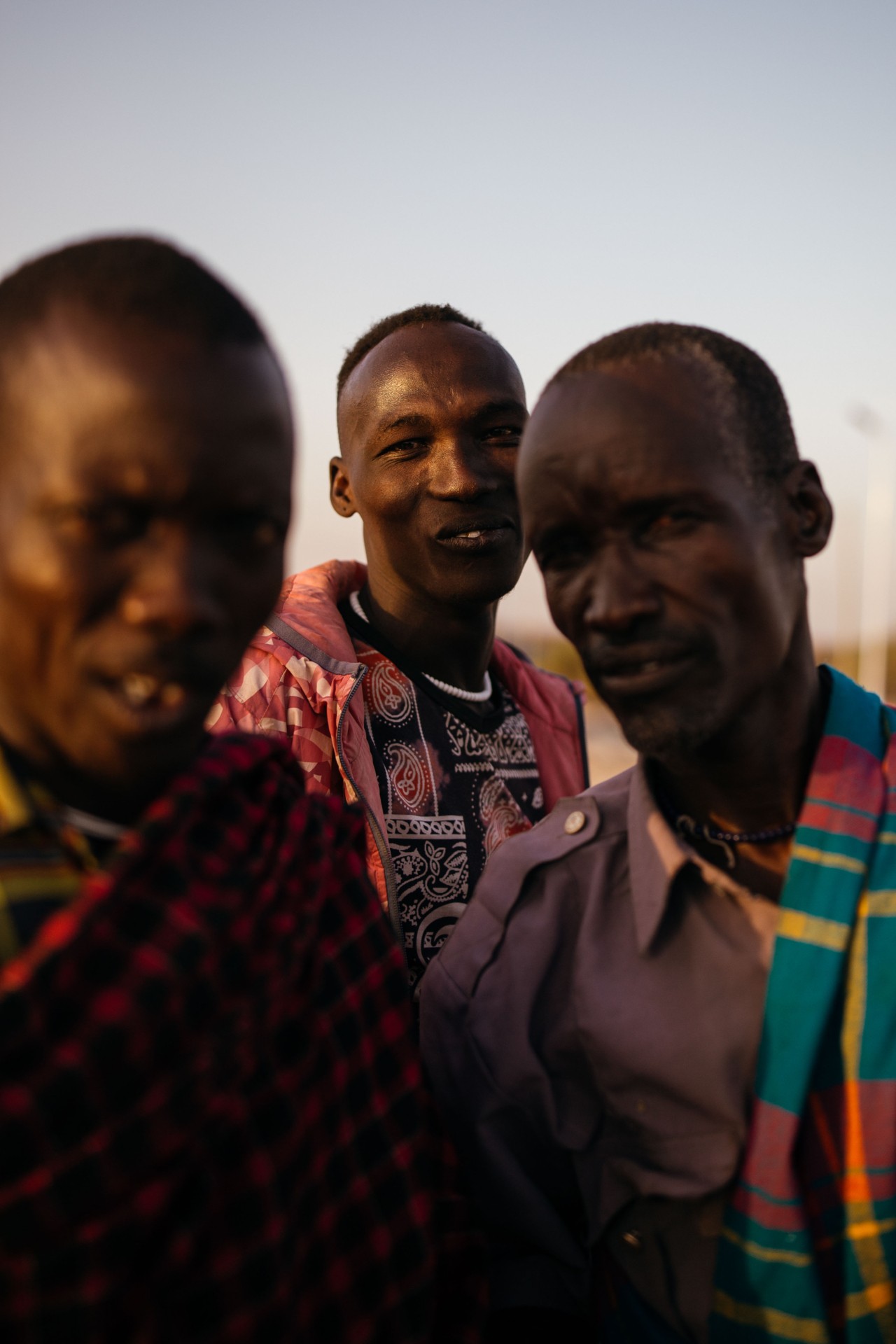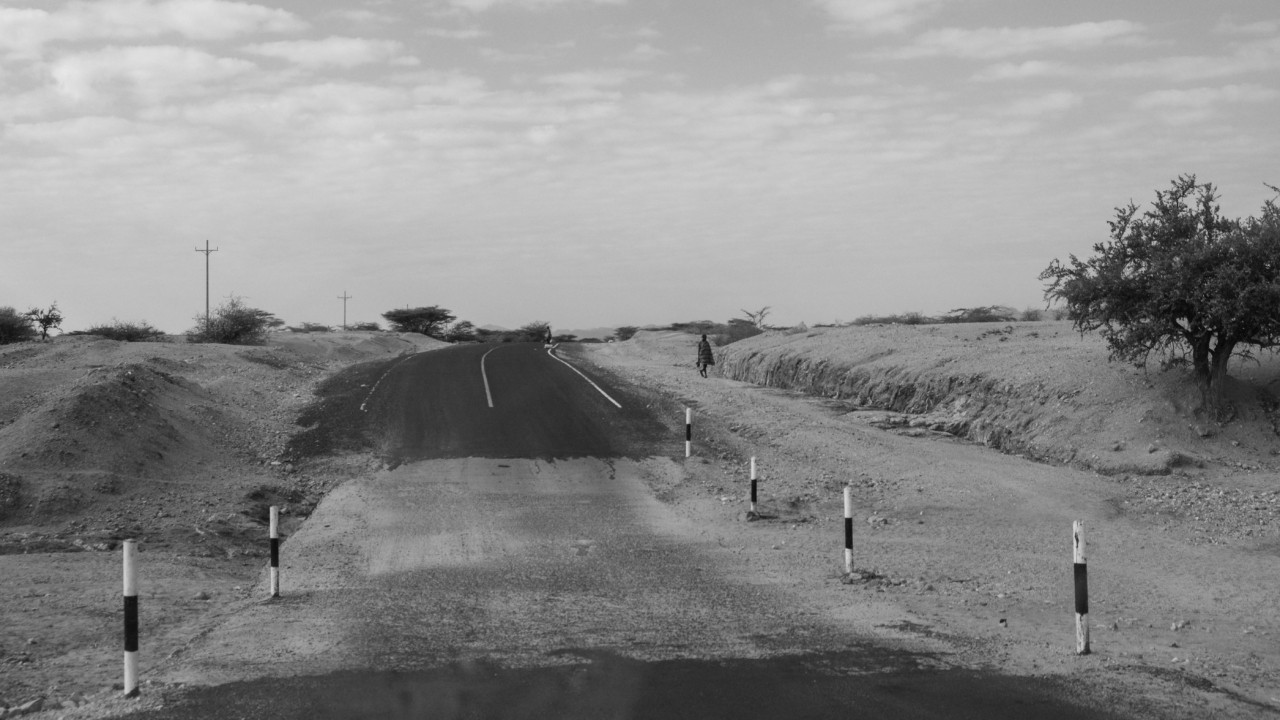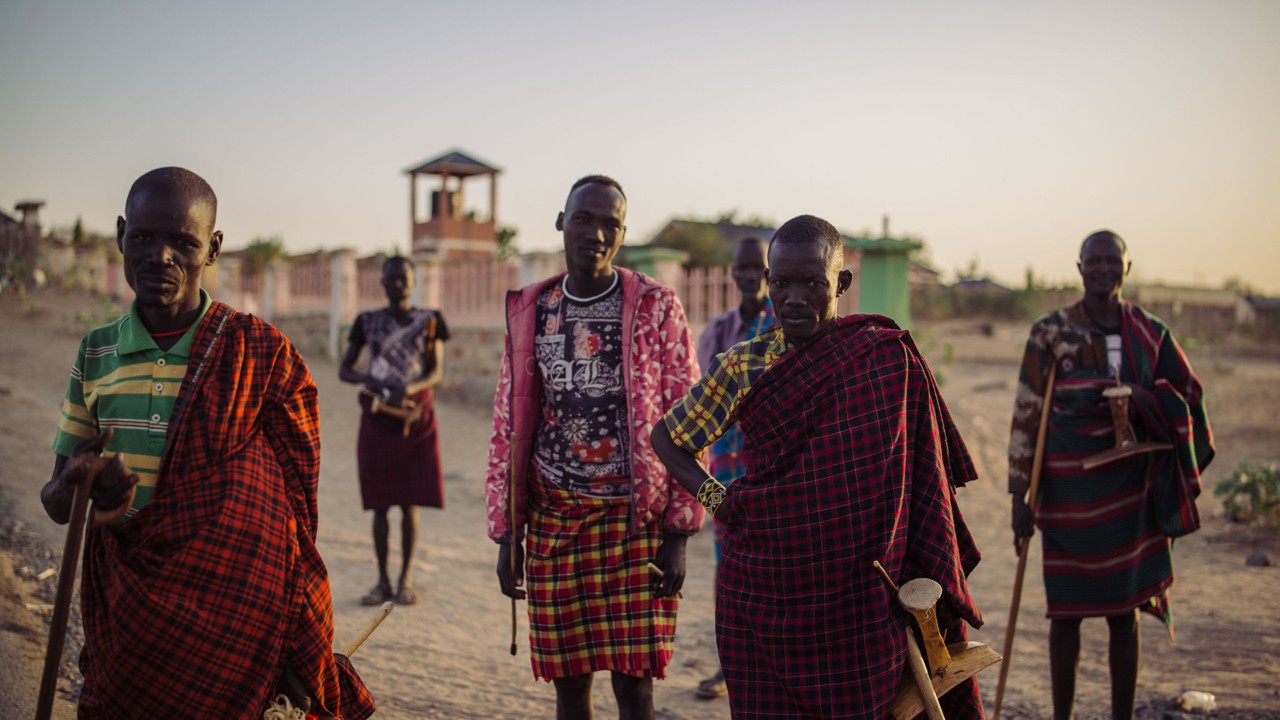
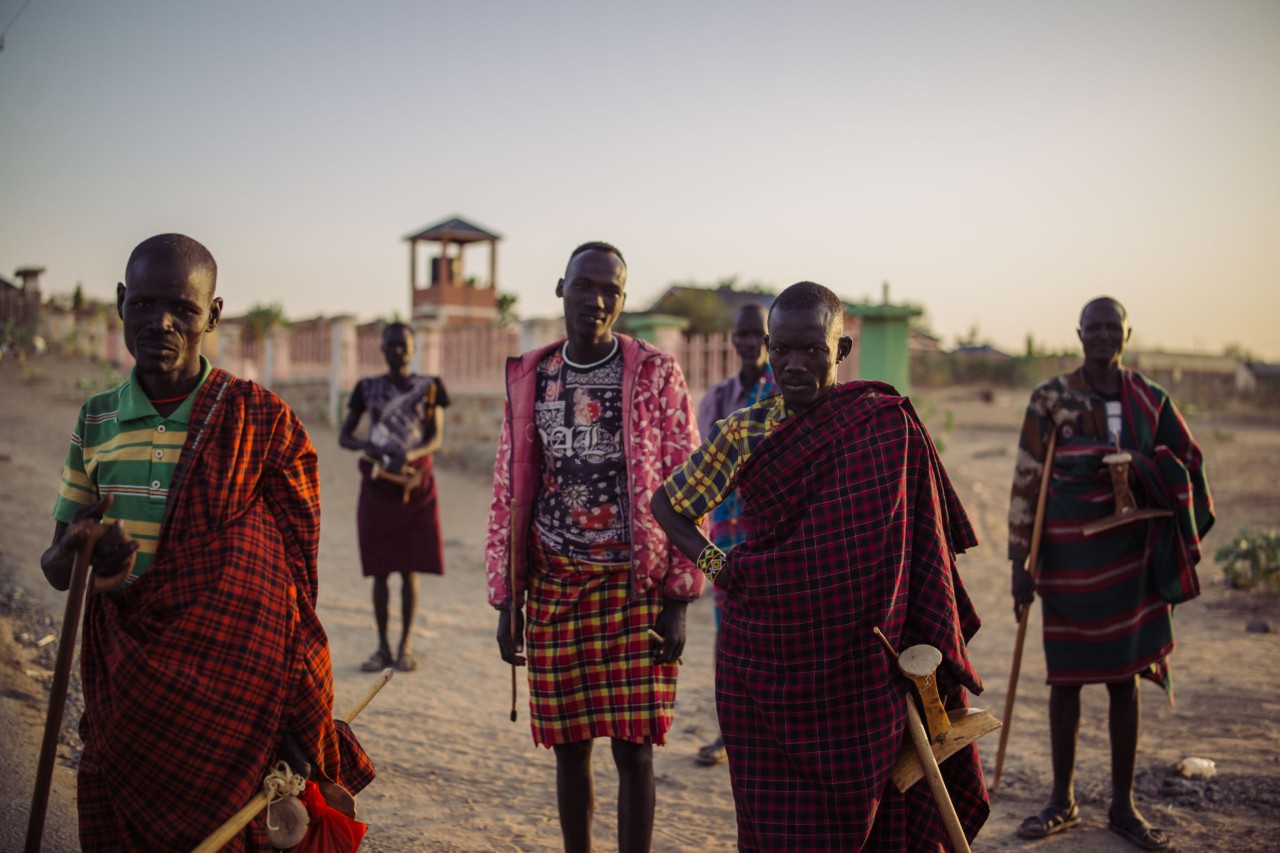
Turkana herders in Lodwar, the county’s largest hub, ushering their animals home in the evening.
WORDS and photographs BY KANG-CHUN CHENG
This story was supported by the Uproot Project Environmental Justice Fellowship.
It’s nearly 100ºF degrees in the scrawny shade of a cluster of withering acacia trees, where Anam Maraka is tending her toddler along with a dozen or so other mothers of Riamram Kori, a remote village nestled in northern Kenya’s Turkana County. Since the Kakali River that once flowed through their backyard dried up seven years ago, life is even harsher than before. The 500 or so remaining villagers of Riamram Kori are mostly women, children, and elderly men. Young folks—men in particular—have left for employment opportunities elsewhere, anywhere but here. The women take daily shifts to walk as much as 30 kilometers roundtrip in the punishing heat to the nearest town, Lokichar, just for water.
“Older people can’t leave, young men go back to town to try to find work,” said Maraka. Trouble seems to follow those devoid of better options: Extrajudicial killings are not uncommon for crimes like petty theft, she continued. “Stealing is becoming the only way to survive.”
Turkana bears a well-documented history of marginalization and might as well exist in an orbit of its own, separate from the rest of Kenya. While the capital city of Nairobi, fueled by innovation and an active international presence, has been dubbed “Silicon Savannah,” the north has long struggled with bouts of insecurity, conflict, extreme and endemic poverty, and geographic isolation.
Now, residents of Riamram Kori and other villages surrounding Lokichar have another nemesis for their woes: the discovery of oil.
In the early 2010s, Tullow, an Anglo-Irish oil exploration company, struck oil, as much as one billion barrels, in the South Lokichar Basin. As of last May, the company gained full control of oil licensing rights there. For a region deprived of economic opportunity, fossil fuel exploration has presented a tangled mess of pros and cons for the community to unravel.

Kenyan media nearly imploded with accounts of how this could alter the trajectory of the region. “Before 2012, we were considered the dumb people of Kenya,” said 29-year-old Lokichar-native Samal Methuswella as we walked along the barbed length of the now defunct Ngamia 3 piloting well, one of 380 dug across Turkana, where security guards still man the gates. But since Tullow, there has been an uptick in investments, from hotels—the one that many locals in Lokichar recommend to visitors is named Black Gold—to microfinancing, all catering to oil activities.
Still, while many welcome economic opportunities, community-based human rights groups have documented countless local complaints: land seizures, forced displacement, pollution, water extraction, and bribery, just to name a few.
Layered on top is the fact that Kenya is one of the most climate-vulnerable countries in the world. While fossil fuel allies have marketed oil as a fix for poverty, especially in Africa, many of the countries that would purportedly benefit will also bear the brunt of the climate impacts those newly extracted resources will later inflict.
Turkana sits squarely in the moral morass of climate justice’s most pressing questions. Can we bolster economies in ways that center human rights and community engagement? Can we lift frontline communities out of energy poverty without locking them into climate disaster in the future? What unfolds in Lokichar may be a model, for better or worse, of what’s to come.

“The heat of the oil has changed the environment. People will tell you that their lives are hard now, because of the oil.”
Systemic neglect of the north dates back to the colonial era. British officers described Turkana as “the most worthless district in Kenya.” The independent government grandfathered in this attitude, furthering the north’s political, economic, and social exclusion. Many Turkana prefer not to speak Kiswahili, one of the national languages, or even identify strictly as Kenyan. Decades of deliberate marginalization have whittled these communities’ faith in the state down to nothing.
Tarmac roads didn’t even exist in Turkana until recently, said Lawrence Wanjogu, my driver and guide. The road we took from Lodwar was built only five years ago to facilitate petrol activities. “It used to take us four hours to travel those 45 minutes,” he told me.
Ngingolol Echwa, another Riamram Kori resident, is between 80 and 90 years of age (in Turkana culture, it’s not customary to keep track of one’s age, or the number of children one has). He once owned camels, cows, donkeys, and goats, but most of his animals are gone now—either stolen by rival Pokot raiders or dead from successive droughts. Echwa still thinks about the wealth he once had but has accepted the situation for what it is. “I’m just waiting to die,” he said, tossing a village dog some of the ugali (maize meal) that he’s eating.
Walking along the sandy riverbed of the Kalkali, Thomas Eramram—a pastor-turned-community advocate, the chairperson of the Lokichar Community Development Wash—indicated a few sandy holes where villagers have dug in the hopes of hitting some groundwater reserves. “The Turkana once migrated for water sources, months at a time. But everything is dry now. Things are changing—they say it’s climate change,” said Eramram.




“This oil has brought more changes than anything else,” said Maraka, the Turkana mother. “The heat of the oil has changed the environment. People will tell you that their lives are hard now, because of the oil.”
Eramram has taken it upon himself to liaise between the Kenyan government, foreign oil extractors, and remote communities. Corruption means that locals are often the last to know what is happening on their land. Although a 2016 law banned the sale or leasing of communally owned land without the approval of the whole community, land-grabbing still persists.
The Turkana Development Organization Forum (TUDOF) is one of several organizations scrambling to get Turkana land, traditionally communal with informal ownership, officially registered. “We’re pushing to undertake inventory—identifying borders, urban areas, demarcate pastoral areas—so we can receive rightful benefits,” said Gabriel Naspaan, a cofounder and program coordinator of TUDOF.
Alfred Ng’ang’a, a communications associate who works with Tullow, said that the company is abiding by the Kenyan Constitution, which says the government retains all rights to natural resources and thus dictates how revenue from its extraction is shared. “[Tullow] will not allow anything not in line with the Constitution. The government is doing everything to ensure that Turkana citizens will benefit from that resource as much as possible, whether [the land] is registered or not,” he said.

Tullow has indeed helped build schools and water systems in Lokichar. But a weakness in this strategy is that when private companies lie dormant, as Tullow does now, these community projects do, too.
Commercial oil production in Turkana has stalled year after year. “I’ve had people in Lodwar [Turkana’s biggest city] ask me if there really is oil here,” said Elisabeth Schubiger, an anthropologist at the Geneva Graduate Institute. “Water authorities and the county government then say they can’t afford to maintain this system,” Schubiger explained, referring to the dozens of water tanks, pipes, and transport systems in Lokichar that have broken down from a lack of maintenance.
It might be easy to cast oil companies such as Tullow as bad, which Schubiger admits she did before spending more than a collective year in the field, but she has been surprised by how the community has welcomed the industry. “I thought people would be really against Tullow, but the local community welcomes jobs. They want education, exchanges with mzungus [non-Africans],” she said. “At least Tullow is doing something that people can see with their own eyes. Tullow gives the Turkana these things when the state is very absent.”
Even those who are most concerned would welcome Tullow back, with the stipulation of true community engagement. For example, Peter Lopese, a member of the Esanyanait assembly, a watchdog group for Turkana rights and culture that was established in response to Tullow, lamented that the company came and left without informing them, and that they sometimes brought employees from Nairobi rather than hiring out of Lokichar.
Esanyanait has also documented miscarriages in humans and nonhuman animals and a rise in bird deaths in recent years—phenomena virtually impossible to prove are related to Tullow without sufficient resources. Rebecca Lomilio, a 25-year-old who lives with her baby son in Nakukulas, a settlement that Tullow helped expand by building a secondary school and borehole, hopes to see these issues resolved if oil exploration continues. “If Tullow returns, we hope they will rectify what they did—dispose of waste properly. Move it much farther away from the people and the livestock, so there won’t be health problems again,” she said.
“We welcome Tullow back,” added Joseph Lokeya, another Esanyanait member. “But this time, we will be demanding free and informed consent. Tullow must fulfill its constitutional promises.”

The International Energy Agency (IEA) estimates that Africa holds 60% of the world’s best solar resources but less than 1% of installed solar capacity.
The litany of concerns around fossil fuel extraction raises the bigger question: Does Turkana even need fossil fuels to develop, or is it just the only option they’ve been given?
While oil allies have touted themselves as a fix for poverty—to the outcry of many—others have envisioned new booming economies built off of clean energy and community engagement. One such company, Renewvia, is already operating in Turkana. The solar mini-grid company, which began in the US, broke ground in Nakukulas in 2019. “There’s just so much sun there,” said Nicholas Selby, Renewvia’s vice president of engineering. Indeed, the International Energy Agency (IEA) estimates that Africa holds 60% of the world’s best solar resources but less than 1% of installed solar capacity.
Since Renewvia broke ground, socioeconomic progress has been palpable. Besides powering 214 customers in Nakukulas, a mix of households and businesses, the company calculates that one year after mini-grids are established, households will no longer use kerosene lamps in their homes, reducing exposure to noxious fumes. The company also trains local community members to maintain the infrastructure, which, according to a recent analysis by the company, will increase female employment, quadruple household incomes, and boost school attendance. The idea behind all this, said Selby, is to turn the mini-grids over to the communities in about 20 years, granting them ownership over their own electrification.
In some ways, that vision is the opposite of what Turkana has seen for centuries. Rather than being pushed to the margins, their communities are placed at the center of their own development. After so much mistreatment—so much willful neglect—that sort of agency is the least they deserve.

The Great African Oil Dilemma
